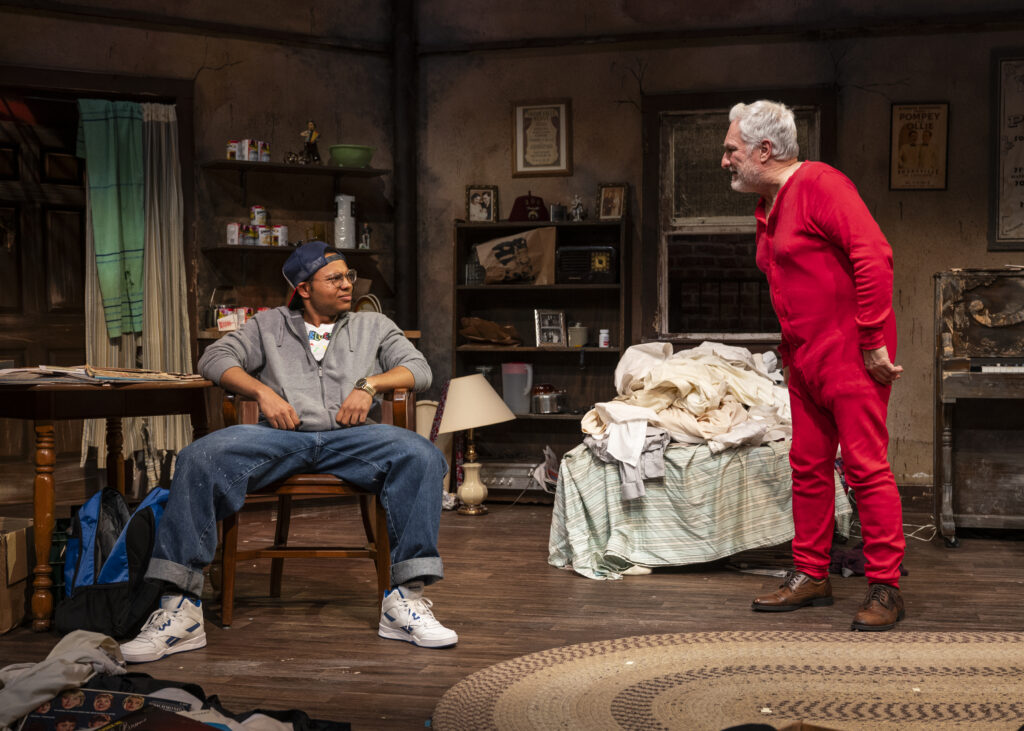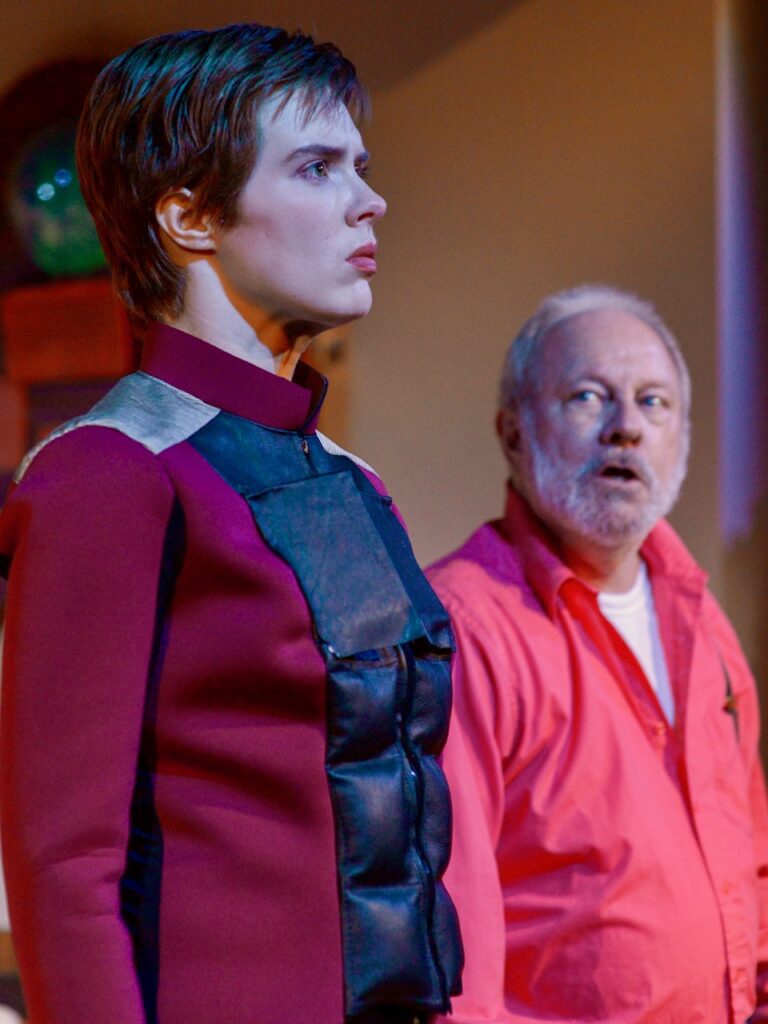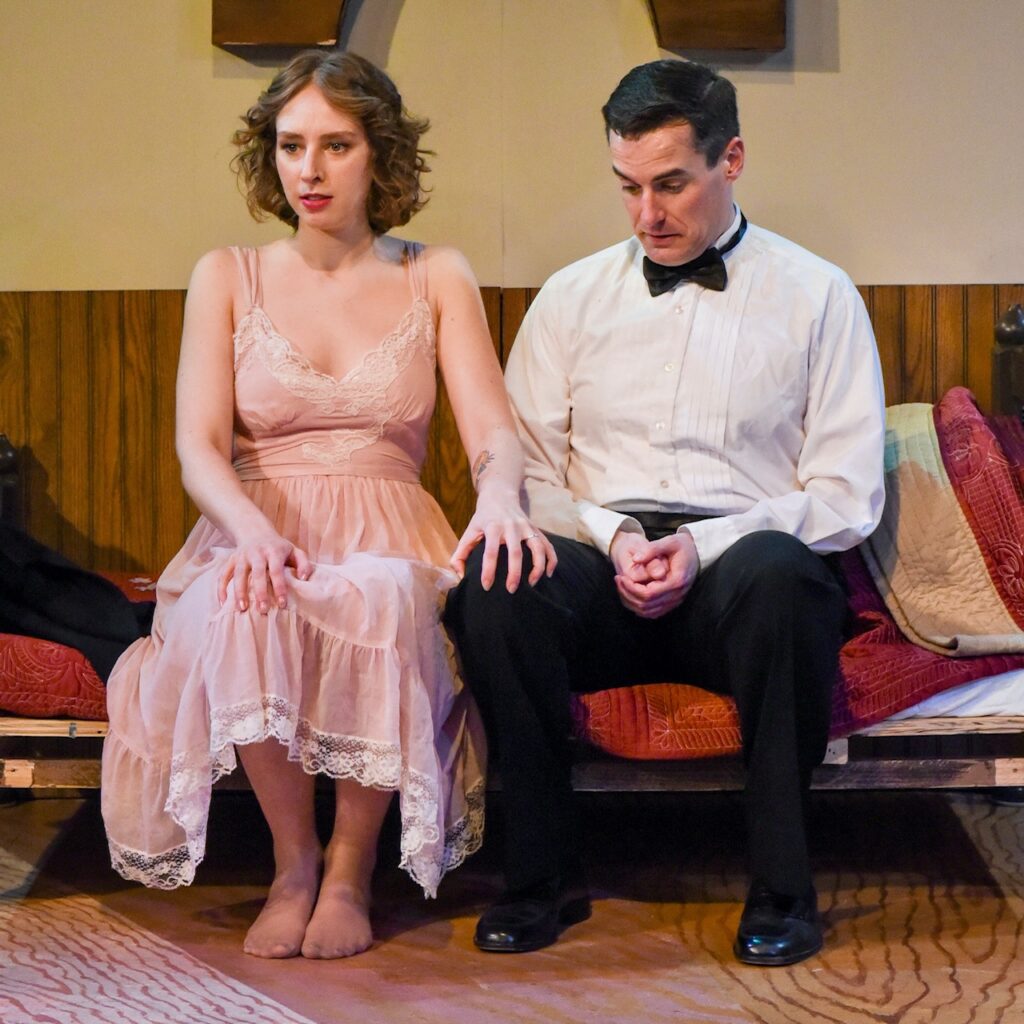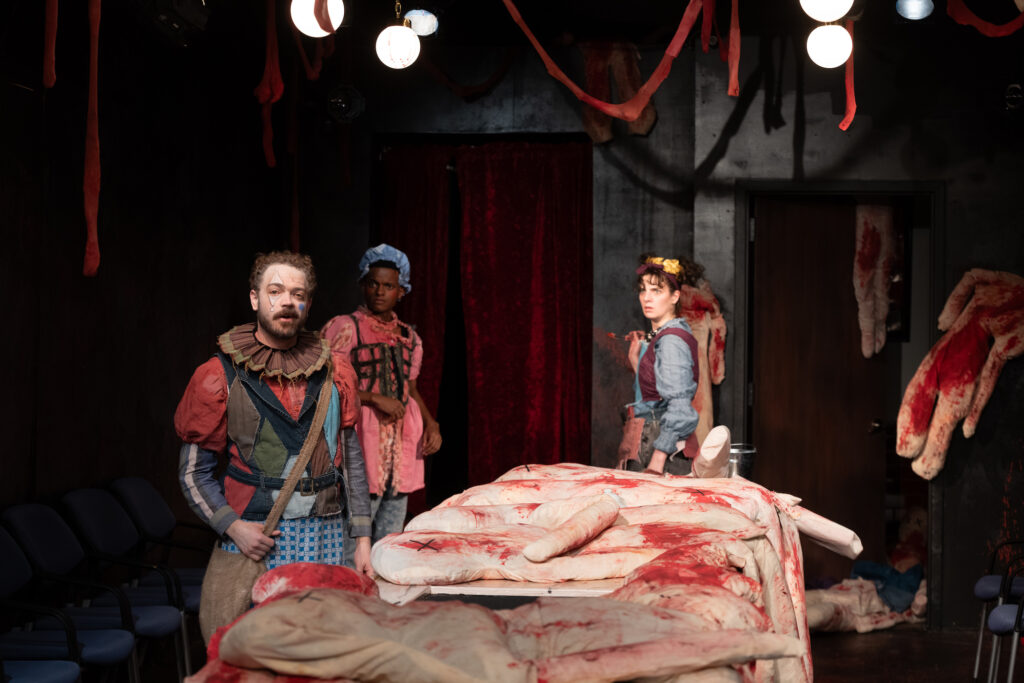
I am not a theater critic but I have been devoted to covering theater since my early 1980s reports on the explosion of Chicago storefront theaters for National Public Radio. On The Mara Tapp Show in the 1990s, I was honored to host weekly conversations about and offer scenes from some of Chicago’s best shows, and delighted when those interviews filled houses for our local theaters.
In 2015, at the request of friends, I started a series of emails with recommendations for shows I thought worthy of patrons. Some years later, actors, directors and publicity people in Chicago’s theater world prevailed on me to share these raves, a request I accepted, especially in light of the increasing tensions in the theater world and need to keep Chicago theaters healthy. Read more…
Find out what the critics think at the Review Round-up on the website of TheatreInChicago.com.
Breaking News
Opera Fans Alert: Catch the June performances in the 2025 Opera Festival of Chicago. It concludes with the iconic Pagliacci June 27 and 29 at the North Shore Center for the Performing Arts in Skokie.
The festival also encourages young artists. On June 5th, the festival’s rising stars will perform Italian operatic standards by Mozart, Rossini, Verdi, Puccini, Weill and other composers that highlight the connection between Italian food, wine and song at Chicago’s Artifacts Events.
More seasoned singers will honor the festival’s theme in the June 14th Love is a Triangle featuring the music of Verdi, Puccini and others in the Jarvis Opera Hall at Holtschneider Performance Center at DePaul University School of Music.
Get the details on all of these performances at https://operafestivalchicago.org/
In other news, I’ve stepped into the 21st Century and you can find me on Instagram at https://www.instagram.com/tappraves/. Please follow me to shine a spotlight on the excellent performing arts organizations and artists I am honored to cover.
Raves
Golden Leaf Ragtime Blues

American Blues Theater through June 29
Highly Recommended
Two men stand in what should be a spotlight. One is dressed as a clown; the other in bright red long underwear. Like old pros, they start their vaudeville act but what makes us laugh quickly makes us want to cry because our man in red cannot remember his lines. Again and again.
This is how memory loss works, whether it’s from Alzheimer’s, dementia, brain cancer, stroke, grief or other causes. Many of us have experienced this devastating decline in someone we love, which makes this scene hard to watch. Fortunately, as is sometimes the case with mental declines, Golden Leaf Ragtime Blues offers moments of connection and joy.
These two men are Pompey and Ollie. Ollie is telling Pompey that they can’t continue their longtime partnership because Pompey can’t recall his lines. Pompey’s response to such news is frustrated despair, halted by the arrival of his daughter, who is also concerned about his decline. They are soon joined by her son, and that is when Golden Leaf Ragtime Blues moves into the sphere I associate with Playwright Charles Smith. It turns out daughter Marsha is a social worker who is fostering and considering adopting her son Jet, whose real name is J’Taurius – there’s a lovely exchange about the importance of names that’s not to be missed – but his presence rankles Pompey, whose racism goes on high alert. The bulk of Golden Leaf Ragtime Blues revolves around Pompey and J’Taurius’ uneasy relationship, and their difficult dance of acquaintance. What’s refreshing here is that that every time this play seems like it’s heading for stereotypes Smith pulls it back and offers insights about aging, racism and the borders of our divided city that are arresting, authentic and fresh.
How excellent to have a play by Charles Smith back on a Chicago stage. His Golden Leaf Ragtime Blues has the hallmarks of his earlier works that examined race, politics and our identities in plays about W.E.B. Dubois, Marcus Garvey and others. Most premiered at Victory Gardens Theater, where the playwright, who grew up in Chicago’s South-side Bronzeville neighborhood, was part of the much-lauded and sadly defunct Playwrights Ensemble, a diverse-by-every-measure corps started in 1974.
Director Chuck Smith, not to be confused with Playwright Charles Smith, is the dream partner here, partly because of their long affiliation. Justin Banks shines as, an intelligent, street-wise teenager who defies the stereotypes with a perfect mix of rage, grief and wisdom about the realities of foster homes and lack of justice in our legal system – all acquired way too young. I was struck by how true his portrayal rang, matching my experiences with foster children in systems plagued by ineptitude, needless bureaucracy and racism. I was also grateful for Banks’ portrayal, which brings out for the persuasive and unique personality of Smith’s character. Dennis Cockrum is ideal as Pompey, making his moments of anguish, prejudice and connection equally moving. My brilliant redheaded companion noted that each of these characters are disempowered in a system that offers them bad institutional choices, and punishes them for the perfectly human response of rage. I credit Charles Smith’s script for these sensitivities, and Banks and Cockrum for making us see their similarities.
Dawn Bach as the harried and humorless Marsha strikes the right notes of a daughter trying to cope with an aging father, and a social worker trying to do good in a flawed system. Each of these three characters go through revealing changes in Golden Leaf Ragtime Blues. James Sherman, himself a former member of VGT’s Playwrights Ensemble, portrays Ollie with a fine mix of sorrow and wisdom, allowing us to understand the old days and new realities.
You couldn’t have a better set than the run-down room with cracked walls, piles of dirty clothes, cans of empty SpaghettiOs and stacks of junk thanks to the creative collaboration of Shayna Patel and Tyson Carter. Lilly Walls’ costumes enhance their wearers, from Pompey’s red long johns to Ollie’s patched jacket over demin overalls to Marsha’s no-nonsense pants suit to J’Taurius’ teen uniform of jeans, white t-shirt and zippered jacket.
What could be a classic story about aging or racism or the wisdom of youth is elevated thanks to Charles Smith’s typically insightful script and a talented, well-directed cast. We come to better understand the foster care system, as well as the value of cross-generation connections, the pain of being alone and the dangers of racism. Golden Leaf Ragtime Blues is a play to be savored for all that and it bittersweet hopefulness. Don’t miss it.
R.U.R. (Rossum’s Universal Robots)

R.U.R. (Rossums Universal Robots)

Photos by Steve Graue.
City Lit through June 15
Recommended
Imagine a world in which robots take over our lives. Or computers. It’s not so hard to believe in these days of omnipresent cellphones, synced devices, data mining and artificial intelligence. In fact, if you’re seeking human contact, it’s rather bleak right now, but you can experience a dramatic reminder that the past is prologue, and have a lot of laughs, at City Lit’s revival of a prescient 1920 play.
R.U.R (Rossum’s Universal Robots) was written by Karel Čapek, a Czech author, playwright and journalist who invented the word “robot” for this play. His anti-fascist actions ran counter to the Nazis. Bo List, a playwright and director, “freely adapted” Čapek’s play, and that version is now onstage at City Lit.
This adaptation starts as a silly screwball comedy but also tackles larger issues, like the future of the human race. The premise is simple: The oddball son of the founder of the world’s leading robot manufacturer, Rossum’s Universal Robots, gets a surprise visit on his remote island from the president’s daughter. The opportunity for a good business connection, and perhaps even marital bliss, ensues before matters get really scary.
Bryan Breau gives us a Harry Rossum full of nervous ticks, quirky charm and scientific knowledge that seems essential to a man who has inherited his father’s robot factory. Alquist, R.U.R.’s financial manager and accountant, who started with Rossum’s father, is well played by Brian Parry. He conveys the sense and wisdom of a knowing elder, and is the keeper of knowledge and ethics. Mary Ross is amusingly overbearing and quirky as the smart Chief Engineer Dr. Gall. Madelyn Loehr gives us a president’s daughter who is a woman with a good understanding of her official responsibilities, as well as a heart and moral compass. Her chaperone Nana, who has cared for Helena for years, is nicely played by Shawna Tucker, and is clearly the source of her charge’s morals and ethics, but she, too, is a woman with a heart. All of the robots – Alex George, Brendan Hutt, Claudia Sevilla and Shaun Kelly – are excellent in a series of robot roles. They persuasively convey machine sensibilities with their mechanical movements, as well as something far more menacing, which I will not spoil the story by revealing.
Director Brian Pastor expertly manages this large cast. Jeremiah Barr’s set, Meghan X McGrath’s props and Beth Laske-Miller’s costumes capture the aesthetic delights of the 1920s. A bonus is an unsuccessful clown robot playing a deliciously inept role.
R.U.R. is one of several plays now on Chicago stages that modernize classics and, in so doing, heighten their relevance to our current political and social scene. It offers an amusing and sobering evening, even if the play seems a bit long at times. That’s redeemed by the skills and antics of the cast, the chilling questions raised by both Čapek’s script and the timeliness of this show.
Taylor Mac’s Gary: A Sequel to Titus Andronicus

Photo by Tom McGrath//TCMcGPhotography
Redtwist Theatre through June 14
Highly Recommended
Just hours after the coup-inspired massacre in William Shakespeare’s most brutal play, a clown stands in the middle of Titus Andronicus’ banquet hall, which is strewn with murdered bodies. When the audience applause dies down, he declares “Best first day on the job that ever was.”
It is the start to a sassy sequel to the Bard’s gruesome Titus Andronicus, offering a snappy irreverent piece that plays – pun intended – on the tragedies of its dramatic inspiration with a sense of the ridiculous and a bow to our uncomfortable laughter at such horrific situations when we cannot cope with the enormity of shock and grief. And yet Taylor Mac’s Gary: A Sequel to Titus Andronicus is so much more. Steve Scott’s sure direction and self-described Theatre Artist Taylor Mac’s wickedly inventive script offer a universal anti-war, pro-democracy message. Thanks to them, and a crackerjack cast, the cautions about corrupt power structures in Titus Andronicus are present, along with a clear perspective on how societal breakdowns and greedy power-grabbing lead to the needless loss of lives. After all, in what other play does a queen mother unknowingly eat her sons baked into a pie at the order of a vengeful general, as happens in The Lamentable Tragedy of Titus Andronicus? In the sequel the actors’ recitations and implicit condemnations of classism and sexism also come through loud and clear, and all of this is conveyed with piercing sorrow and wit.
Carol, a midwife, opens the play with the what seems a standard Shakespearean prologue. Cameron Austin Brown is splendid from his faux “Queen’s English” British accent to his moments of nervous worry to his heartbreaking confessions. Next up is Gary. William Delforge expertly plays this nimble clown-turned-maid who bursts with comic utterances, blundering mistakes and blunt assessments all delivered in a fine Cockney accent with American touches. His explanation of the difference between fools and clowns is delicious and sobering. The moral force here is Janice, who really is the maid, but also a witness to much of what happened in Titus Andronicus. Hannah Rhode imbues this role with bluntly realistic working-class wisdom and harrowing memories of the heart-breaking tragedies she saw. Her soliloquy about a rape-and-torture victim’s suffering is a Feminist hymn to hurt and endurance. Rhode’s emotional range is impressive from her start as the straight man, if you will, and most amusing given that she is a woman in a play with a gay man and a character of fluid preferences.
Eric Luchen’s blood-splattered setting, and Robin Manganaro’s life-size, doll-like dummies that litter the stage, work well to heighten the humor-tragedy balance here. kClare McKellaston’s costumes, with their Greek and Elizabethan touches, add much.
All these characters and elements are complementary in this mash-up of modern parlance, samplings from Shakespeare’s oeuvre, contemporary references and themes from the Greek tragedies, which is fitting since some credit Greece as the birthplace of modern democracy. They work together to give us a laugh-out-loud but serious examination of the effects of the relationship between the cruel corruption of the rich and powerful and the long-term oppression of the poor and powerless. This sequel doesn’t shy away from the damage such oppression has on society and the underclass. As my brilliant red-headed theater companion noted, this macabre slapstick raises questions of who we laugh at, why we laugh and the power dynamic between the amusing and the amused. Take note: Don’t miss the rapid-fire jokes as they speed by and try to get your companions not to laugh so loud that you can’t hear the next line.
What the corps of Taylor Mac’s Gary: A Sequel to Titus Andronicus pulls off on the heels of a violent coup is an artistic one full of humor, wisdom and hope. This play is a call to arms. Translation: Get off your bum and take action. More immediately make sure you catch this play, which will run in rotation with Redtwist’s Titus Andronicus for a few weeks in June. It will escort you into Shakespeare’s times and reveal the parallels to Trump’s time.
